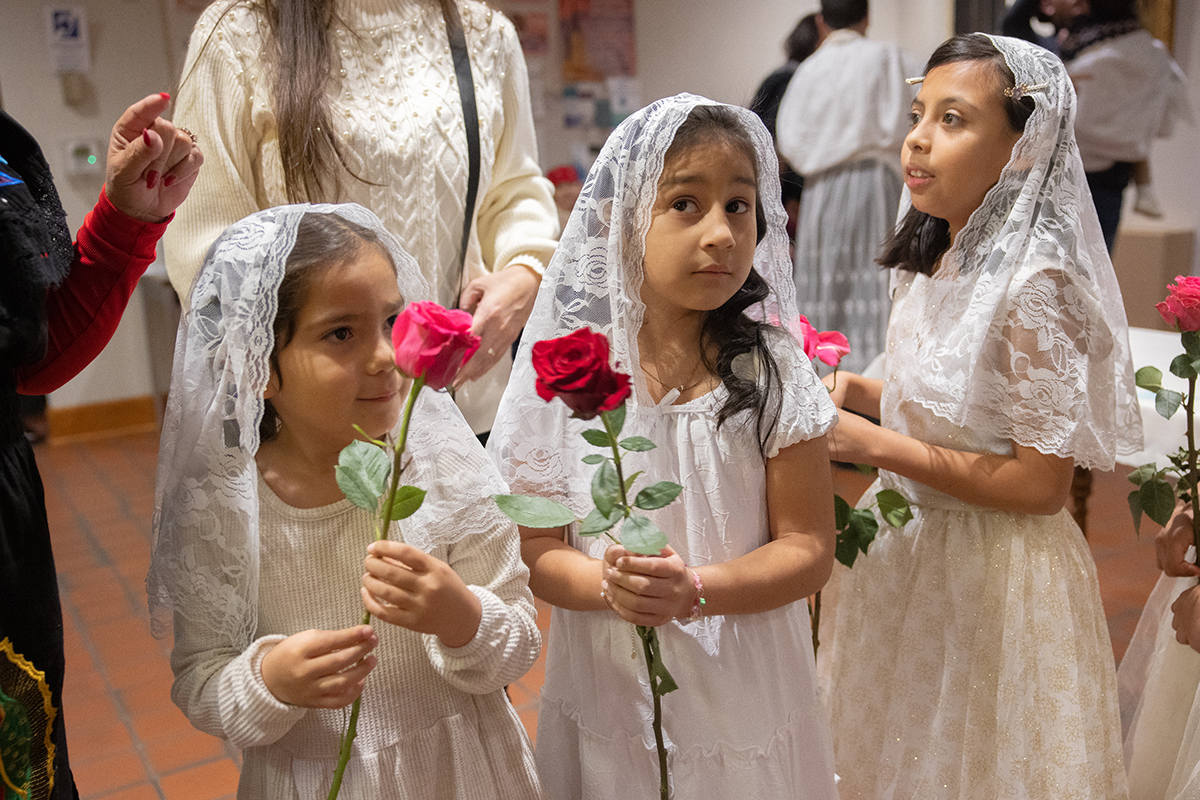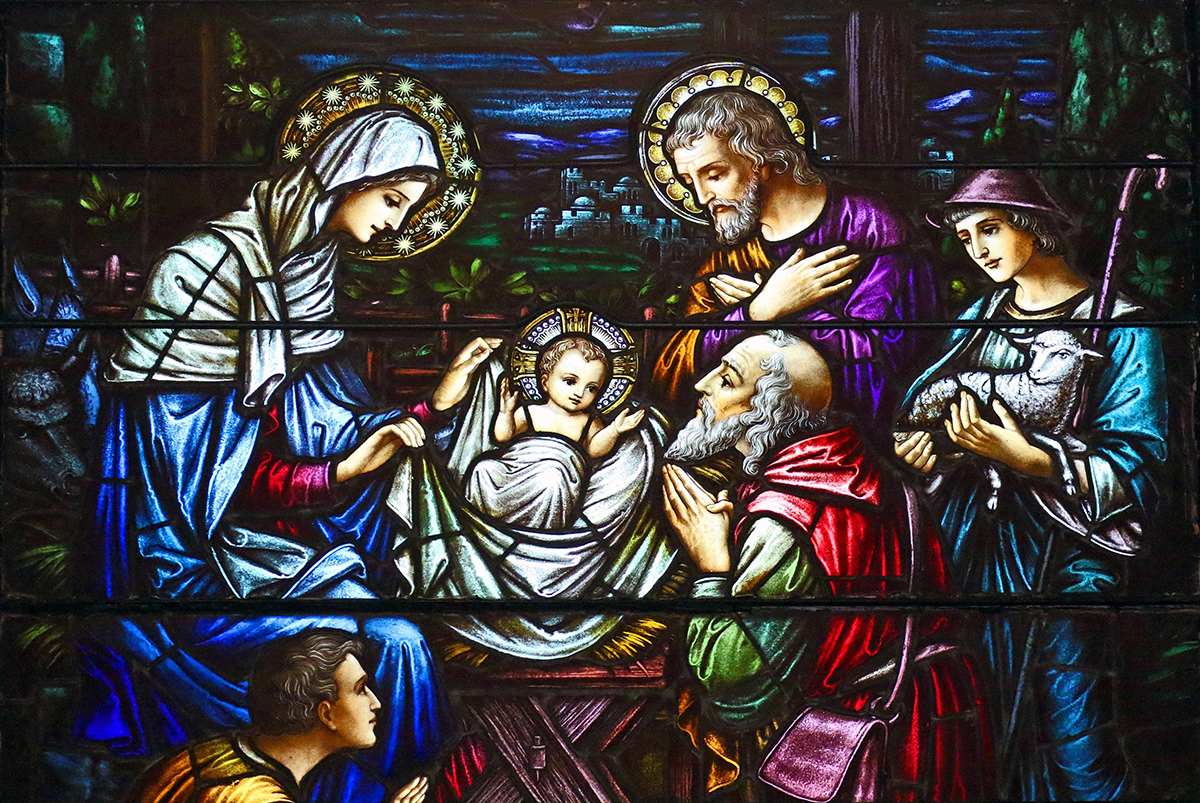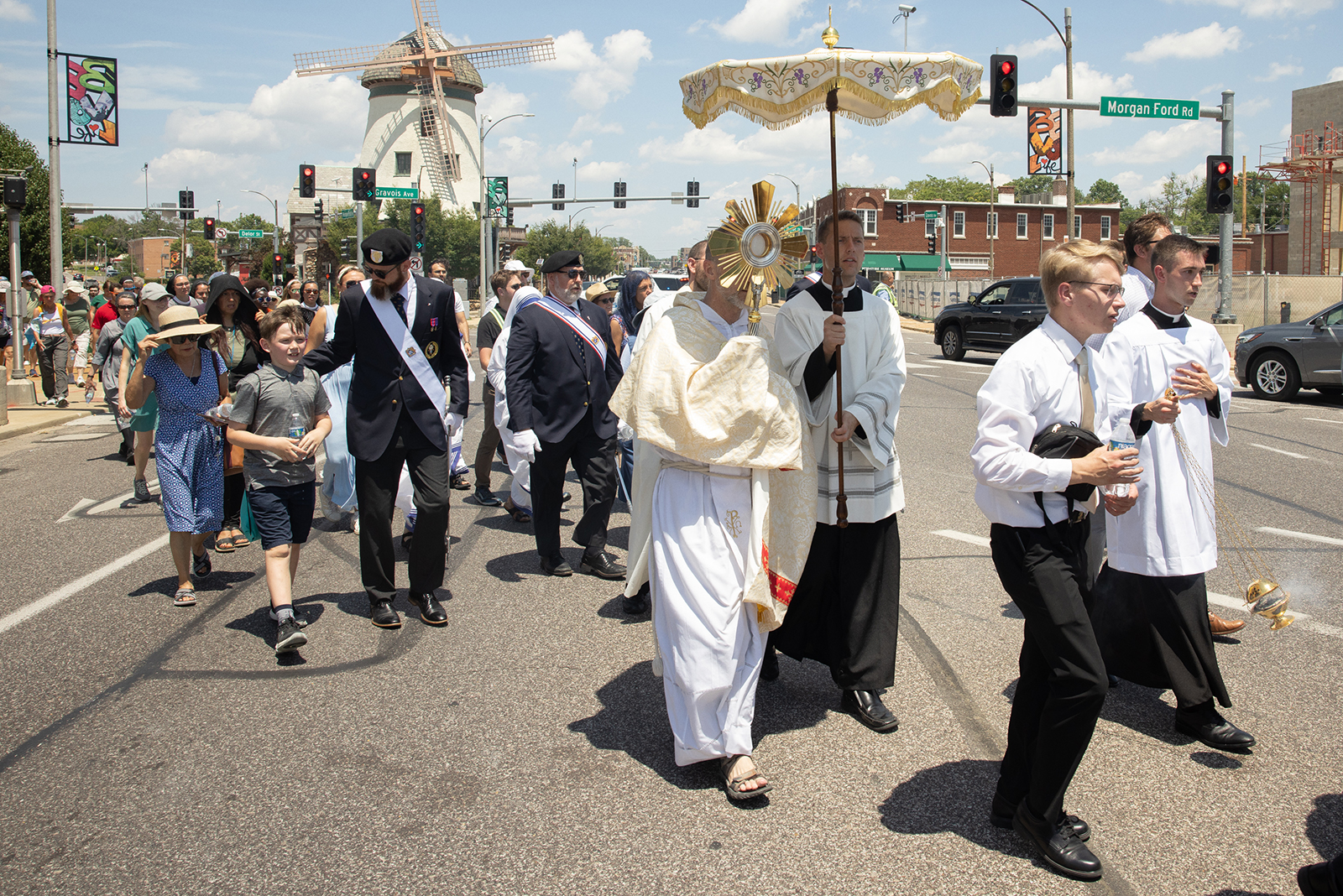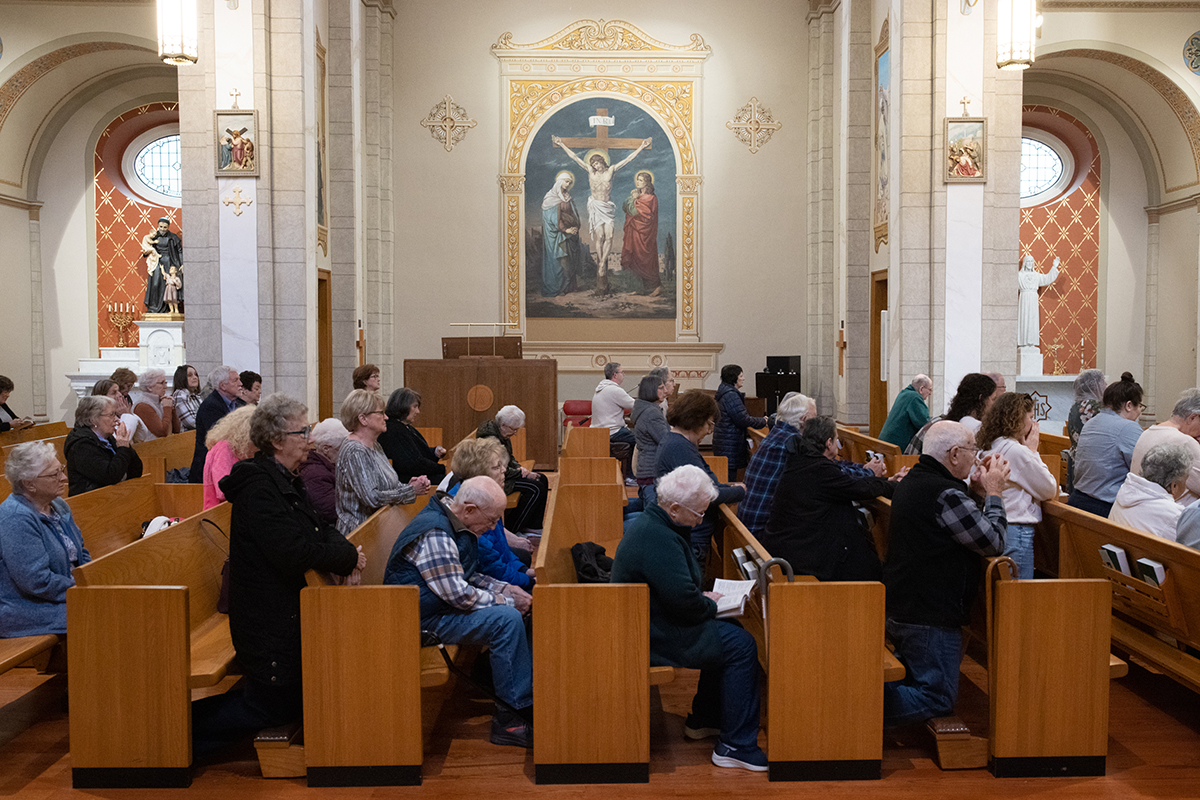Catholics bear witness to life outside Bonne Terre prison where Leonard Taylor was executed
Death penalty opponents prayed for Leonard Taylor, his family, the victims’ family and all involved
On a bus ride to a vigil for a state execution, Father Jerry Stookey, OP, spoke about the Catholic response to the death penalty. There are many reasons to abolish the death penalty — including racism and socioeconomic inequality in the system and the possibility of putting an innocent person to death — but he said Catholics must keep in mind the core of the matter.
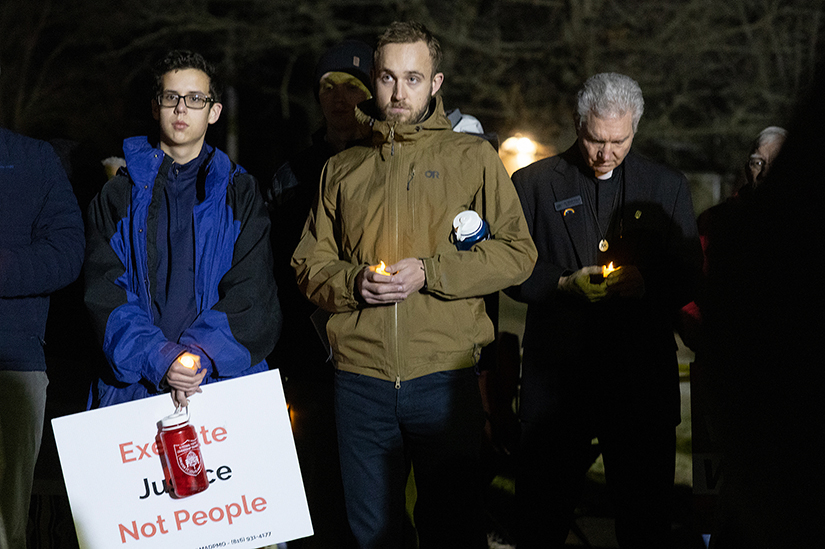
“What’s our ‘why?’ It has to be clear: Our reason is that all are children of God,” he said.
Catholics from the archdiocese traveled to the Eastern Reception, Diagnostic and Correctional Center in Bonne Terre on Feb. 7 to pray and bear witness to the dignity of all life during the execution of Leonard “Raheem” Taylor. He was convicted of first-degree murder for the 2004 shooting deaths of Angela Rowe and her three children, Alexus Conley, AcQreva Conley and Tyrese Conley, in Jennings.
David Callon, an English teacher and moderator of the Men for Life club at St. Louis University High School, brought three club members to the vigil. Club members have often participated in execution prayer vigils at St. Francis Xavier “College” Church, and many recently attended the March for Life in Washington, D.C.
“We’re trying to help our young Catholics, and our Catholic community in St. Louis, keep the dots connected between all the ways that life is under threat and all the ways we have to care for the Gospel message,” Callon said. “That’s really challenging in our political culture, to try to be a living witness for another way of proceeding that doesn’t fit the ideological categories that we happen to have been given by our culture.”
Sophomore Jacob Grijalva made the journey to Bonne Terre “because I’m Catholic,” he said. “Like it says in the Catechism, we need to stand up for social justice. And I felt like this is what I needed to do.”
“Something that stuck with me is that Dr. Callon said that whoever is being executed in our name, the name of the people of Missouri. That’s an unsettling thought,” he continued.
Bryan Sokol, the father of SLUH freshman Simon Sokol and a professor at Saint Louis University, also spoke to the bus riders about his experience teaching a class for inmates in the Bonne Terre prison. His Catholic faith compels him to teach inside the prison, and that’s also why he wanted to attend the vigil, he said.
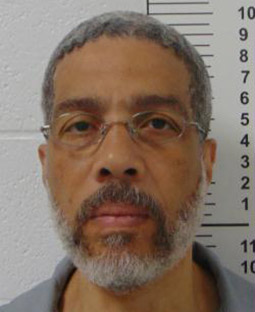
Two of his students got to know Taylor while they were in the Potosi Correctional Center together. “They both thanked me and the rest of you for being present this evening,” he said. “They knew that (Taylor) would appreciate that.”
Villa Duchesne school counselor Theresa Wiss invited students to accompany her to the vigil because “they really need to know that this is going on in their state, and that there is something to do about it besides just read about it,” she said. “And it’s a way of looking at pro-life issues through another lens — it’s all aspects of life, from womb to tomb.”
Senior Seraphia Weingart agreed. “I feel really passionate about abolishing the death penalty,” she said. “So when I had the opportunity to come, I felt like I had to be here and offer support and pray for (Taylor)…this is pro-life to me.”
After praying the Sorrowful Mysteries of the Rosary, the group arrived at the Bonne Terre prison, where they gathered with others present to pray for Taylor, his family — including his daughter, who was present — the victims’ family and all involved in the execution. Taylor died by lethal injection inside the prison at 6:16 p.m.
Students from the Catholic Student Center at Washington University in St. Louis were also there to pray and witness.
“I feel like it’s my job, and the jobs of all of us who profess this faith, to show up when we see something that is against the will of God. And in this case, that means coming out here to this vigil to stand in solidarity,” Washington University student Grace Anderson said. “We’re hoping that just being together, slowly gathering this community, will lead to conversion of hearts.”
Campus minister Sean O’Rourke was a pen pal to Ernest Johnson, who Missouri executed in October 2021. O’Rourke came to the vigil when Johnson was killed and has come to every one since.
“Part of my goal as a campus minister is to give students the opportunity for formation in the faith, and that can look a lot of different ways,” he said. “Coming to a vigil is one of those ways of giving formation and living a Christian life.”
He’s seen an increase in the number of people coming to the vigils over the past year and a half, he said, which “gives a little glimmer of hope in the midst of a really sad situation.”
“I feel like if it’s something that’s important, then you show up. And I just hope that by showing up and doing other things like calling the governor and writing legislators and getting more people on board to come to something like this, then one day, we won’t have to be out here,” O’Rourke said.
Taylor’s execution was the third in less than three months in Missouri. It was the fifth execution nationwide in 2023. The Missouri bishops had asked Gov. Mike Parson to grant clemency to Taylor, but Gov. Parson denied it.
>> Church teaching on the death penalty (updated 2018)
Recourse to the death penalty on the part of legitimate authority, following a fair trial, was long considered an appropriate response to the gravity of certain crimes and an acceptable, albeit extreme, means of safeguarding the common good.
Today, however, there is an increasing awareness that the dignity of the person is not lost even after the commission of very serioius crimes. In addition, a new understanding has emerged of the significance of penal sanctions imposed by the state. Lastly, more effective systems of detention have been developed, which ensure the due protection of citizens but, at the same time, do not definitively deprive the guilty of the possibility of redemption.
Consequently, the Church teaches, in light of the Gospel, that “the death penalty is inadmissible because it is an attack on the inviolability and the dignity of the person,” and she works with determination for its abolition worldwide.
Catechism of the Catholic Church, 2267
On a bus ride to a vigil for a state execution, Father Jerry Stookey, OP, spoke about the Catholic response to the death penalty. There are many reasons to abolish … Catholics bear witness to life outside Bonne Terre prison where Leonard Taylor was executed
Subscribe to Read All St. Louis Review Stories
All readers receive 5 stories to read free per month. After that, readers will need to be logged in.
If you are currently receive the St. Louis Review at your home or office, please send your name and address (and subscriber id if you know it) to subscriptions@stlouisreview.com to get your login information.
If you are not currently a subscriber to the St. Louis Review, please contact subscriptions@stlouisreview.com for information on how to subscribe.

